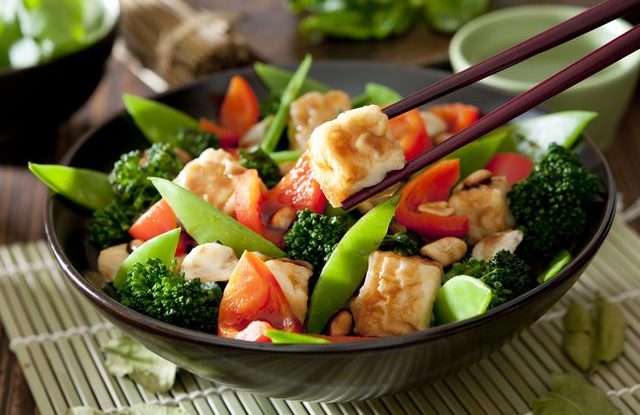Why Choose a Vegetarian Diet?
You may choose a vegetarian diet for many reasons. You may not want to harm animals. You may have political reasons for not eating meat. You may feel that not eating meat is healthier. Or you may avoid meat for religious reasons.
Is It Possible to Stay Healthy Without Eating Meat?
The American Dietetic Association and many other health organizations say that vegetarian diets can be very healthy. Whatever your reason for choosing a vegetarian diet, you will need to learn a bit about nutrition in order to stay healthy—especially when you are pregnant.
What are The Benefits of a Vegetarian Diet?
If you eat a well-balanced vegetarian diet, you will have a lower risk of
- •Obesity
- •Heart disease
- •Diabetes
- •High blood pressure
- •Colon cancer
If you already have some of these health concerns, eating a vegetarian diet may improve your health.
Can I Get Enough Protein Without Eating Meat?
Yes, you can. Protein is made up of several amino acids. Animal products—like meat, fish, chicken, eggs, and milk—have all of the amino acids and are considered complete proteins. Plant foods—like grains, beans, and nuts—each have some of the amino acids, so they are usually incomplete proteins. By eating a wide range of plant foods, you can get all of the amino acids you need for complete protein. If you are not pregnant, you need about 46 grams of complete protein every day. That goes up to 71 grams per day when you are pregnant.
Are There Other Nutrients that I Should Pay Attention to if I Want to Stay Healthy on a Vegetarian Diet?
Other nutrients besides protein that you will want to make sure you get enough of are vitamin B12, vitamin D, calcium, iron, and essential fatty acids. The flip side of this sheet lists good food sources of these nutrients and some guidelines for how much to eat.
I’ve Been a Vegetarian for a While, but I Just Found Out I am Pregnant. What Can I Do to Make Sure my Baby is as Healthy as Possible?
Most of us slip into habits and lose site of exactly what we are eating every day. If you are newly pregnant, you might want to do something you probably did when you first became a vegetarian—keep a list of everything you eat every day for a while. Check your list against the recommendations on the flip side of this sheet to see if you are getting all the nutrients you need. You can grow a healthy baby while eating a vegetarian diet!
Diet Guidelines for a Healthy Vegetarian Diet During Pregnancy
In general, your daily diet should include
- •One to two servings of dark green vegetables
- •Four to five servings of other vegetables and fruit
- •Three to four servings of bean and soy products
- •Six or more servings of whole-grain products
- •One to two servings of nuts, seeds, and wheat germ
If you are pregnant or breastfeeding, you should add
- •Four servings of vitamin B 12-fortified foods
- •15 minutes of sunshine on your arms and face or 200 IU of vitamin D
- •Eight servings (1200–1500 mg) of calcium-rich foods
- •Iron-rich foods
- •1 tablespoon of ground flax seed or other N-3 fatty acid-rich food
Vitamin B12
Vitamin B12 is important for the growth of nerve and blood cells. It is only found naturally in animal foods like meat, fish, and milk. Plant-based foods that are fortified with vitamin B12 include soymilk, tofu, cereal, and nutritional yeast.
Vitamin D
Vitamin D is important for growth of the bones and the teeth. It is found in animal foods, but can also be absorbed through the skin from sunlight. Vitamin D-fortified foods include cow’s milk, some soymilk, and some breakfast cereals.
Calcium
Calcium is very important for bone growth and strength. Calcium is found in milk products. Plant-based food sources include broccoli, collards, kale, sesame seeds, almonds, and soy products.
Iron
Iron is used in making blood. It is most commonly found in meat and eggs. Plant-based iron-rich foods include soy, bean, lentils, spinach, molasses, dried apricots, prunes, and raisins. To make the most of your iron, eat it with a high vitamin C food like oranges or strawberries.
Essential Fatty Acids
Essential fatty acids are important to the function of cells and the development of the brain. There are two types of fatty acids: N-3 and N-6. Vegetarian diets tend to have a lot of N-6 fatty acids but be low in N-3. Sources of N-3 fatty acids include eggs, flaχseed, and canola and soybean oils.

No Comments